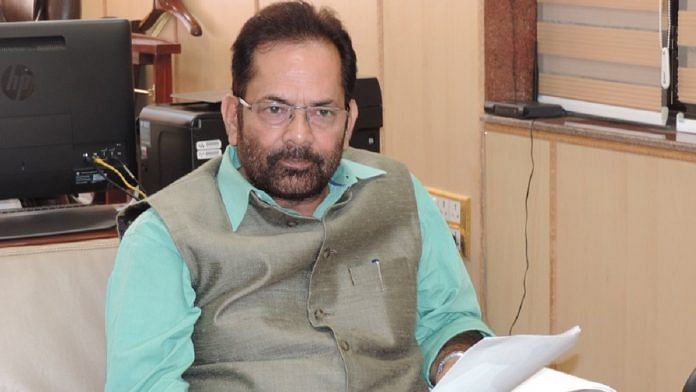Minority Affairs Minister and BJP’s Muslim face says if there is pollution because of any religion’s festival, action should be taken.
New Delhi: The Supreme Court’s ban on the sale of fireworks in the National Capital Region before and after Diwali has raised hackles, with many individuals and organisations labelling the ban anti-Hindu.
But Union Minority Affairs Minister and the BJP’s Muslim face Mukhtar Abbas Naqvi says he doesn’t see the order through a communal lens.
In an exclusive, wide-ranging interview with ThePrint, Naqvi discusses issues like triple talaq, the saffronisation of education, the state of education among Muslims, and reforms within India’s Muslim community. Excerpts:
A lot of people perceived the ban imposed on the sale of crackers in NCR as anti-Hindu. What are your views on it?
We don’t see pollution-related problems as being limited to Diwali. Pollution is a permanent problem, for which we need a permanent solution. A ban on (the sale of) crackers during Diwali will have limited impact.
But if there is pollution because of Diwali, or because of any another religion’s festival, or it’s bad for the health of society, action should be taken. I don’t see any Supreme Court order through a communal lens.
Recently, RSS chief Mohan Bhagwat said the Right to Education (RTE) must be implemented in minority schools as well. Do you agree with that sentiment?
I feel that RTE, within the framework of the current system, should be applied to everyone. And if there is any legal impediment to it, there can be some reform. I don’t think applying RTE would diminish the constitutional rights of minorities.
Bhagwat also said that saffronisation of education in India is important and inevitable. Do you agree?
I don’t want to comment on it. I think that Indianisation of education is important. Now you can call it saffronisation or something else. They’re almost the same thing.
Are you facing any difficulty or resistance in implementing the madrasa modernisation scheme?
We have given madrasas a three-T formula – teachers, toilets, tiffin – and then added ‘training’ to it. We said madrasas should also have mainstream education, and 11,200 madrasas have applied for it. We want to have mainstream education in madrasas; shutting them down is no solution.
But some madrasas have objected to providing details like “what is your infrastructure”, “how many teachers do you have”. Some have resisted saying we’ll take funding from you, but we won’t give you information. That is wrong. You will have to give information.
A UGC panel recently suggested removing words such as ‘Hindu’ and ‘Muslim’ from the names of Banaras Hindu University and Aligarh Muslim University. Do you think there is merit in such a suggestion?
I think the recommendation to remove the name of religion from university names was unnecessary. Religion and secularism are not antithetical. Secularism can thrive only when the principle of ‘unity in diversity’ is strengthened.
Secularism is not under threat because of names of colleges like Banaras Hindu University, Aligarh Muslim University, St Mary’s College, St Joseph’s College, Jain colleges, etc. I think the recommendation is unnecessary, and it has been rejected.
Do you think Muslims should avail the benefits of OBC sub-categorisation, which is currently being undertaken by a government-appointed committee?
Thirty to forty per cent of the Muslim community is from the OBC category – nai, dhobi, bhangi, etc. They will all get an automatic advantage. You can’t have reservation on the basis of religion, because that’s constitutionally incorrect. For example, Muslim OBCs will benefit the most out of the OBC sub-categorisation.
Yet, you see that the enrollment rate in higher education among Muslims is even lower than that among OBCs. What’s the solution?
You are right. There is a lack of awareness in the Muslim community. You can’t bring awareness simply by running schemes. That is why we have been sending coordinators to go talk to young boys and girls, and tell them what facilities they have for education, employment, and empowerment.
After triple talaq, do you think there is scope for more reform for Muslim women?
Any reform is more successful if it is within the community. A government cannot impose a reform on a community or religion. Yes, government can clear the impediments to reform on its part. Like (in the case of) Haj (reforms), the government had stopped women from travelling (alone for the pilgrimage), even though Saudi Arabia – an Islamic country – is welcoming (women over 45 without male relatives).
Also read – Haj reform: Minister Naqvi says Muslim women may soon be allowed to travel alone
We have simply lifted that ban. But to accept these reforms and spread awareness is the responsibility of the community.
I feel a reformist approach has increased in the Muslim community. While there cannot be reform in Islam, there can be reform of social evils like triple talaq. But it’s better if it comes from within the community itself.



